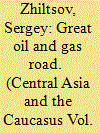|
|
|
Sort Order |
|
|
|
Items / Page
|
|
|
|
|
|
|
| Srl | Item |
| 1 |
ID:
134116


|
|
|
|
|
| Publication |
2014.
|
| Summary/Abstract |
The author concentrates on the geopolitical games in the Caspian region and identifies the factors that have remained prominent in the last twenty years and, in fact, determined the developments in this part of the world, viz. oil and gas reserves, the scope of their industrial production, and the recently built export pipelines as geopolitical instruments of the Caspian states and extra-regional players.
He analyzes the geopolitical aims of Russia, the European Union, the U.S., and China, the key players responsible for the Caspian geopolitical context, to conclude that the region's geopolitical, social, economic, and political future, as well as its interstate relations largely depend on the pace at which oil and gas is produced and pipeline projects implemented
|
|
|
|
|
|
|
|
|
|
|
|
|
|
|
|
| 2 |
ID:
136420


|
|
|
|
|
| Summary/Abstract |
When the Soviet Union collapsed, newly independent states appeared on the shores of the Caspian and in expanses of Central Asia, the horizons of which have significantly widened due to the development of hydrocarbon reserves. This has been essentially promoted by the formation of export pipelines in the east-west direction. We will note that the Soviet pipeline system was created in the north-south direction and intended for managing flows of oil and gas in the interests of the entire state. As for the new hydrocarbon-rich states of the Caspian Region and Central Asia, changing the direction of energy flows has become a key task of their foreign and domestic policy. It is no accident that in the last 15-20 years, regional and extra-regional players have become involved in an extremely intense fight for access to the Caspian’s oil and gas, as well as actively engaged in building infrastructure for their transportation to the consumers.1
At the same time, despite the many forecasts of various research centers and oil and gas companies, the production of hydrocarbons and implementation of pipeline projects has been very slow. The reasons for this include the lack of modern technology in the production branches, undeveloped infrastructure, insufficient financing, and low demand for hydrocarbons from extra-regional states. This is why the forecasts about hydrocarbon production volumes and delivery deadlines from the Caspian Region and Central Asia to the external markets are largely unreliable.
Nevertheless, in the past 20 years, the Caspian and Central Asian countries have succeeded in forming new energy flows and their fields are capable of satisfying the growing needs of the European countries and China for oil and gas.
Among the large-scale hydrocarbon delivery projects being discussed, special mention can be made of the Southern Gas Corridor, the Trans-Caspian Hydrocarbon Transportation System, the Kazakhstan Caspian Transportation System, and the Great Energy Road, each of which is a separate pipeline. These projects are aimed at creating a new pipeline structure called upon to ensure the delivery of hydrocarbons in the east-west direction.
Energy flows are irrevocably tied to the hydrocarbon resources of Kazakhstan (the gas condensate field of Karachaganak and the oil fields of Kashagan and Tengiz), Turkmenistan (the gas field of Galkynysh), and Azerbaijan (the oil field of Azeri-Chirag-Gunashli and the gas field of Shah Deniz).
|
|
|
|
|
|
|
|
|
|
|
|
|
|
|
|
| 3 |
ID:
143210


|
|
|
|
|
| Summary/Abstract |
The geopolitical changes associated with the collapse of the Soviet Union and the emergence of the newly independent states in its territory have led to the appearance of a large number of new pipeline projects. Some of the new projects concerned the delivery of oil and gas in the European (westerly) direction, while others were aimed at creating infrastructure for exporting hydrocarbon resources in the easterly direction—from the Central Asian countries to China.
|
|
|
|
|
|
|
|
|
|
|
|
|
|
|
|
| 4 |
ID:
067409


|
|
|
| 5 |
ID:
053682


|
|
|
|
|
|
|
|